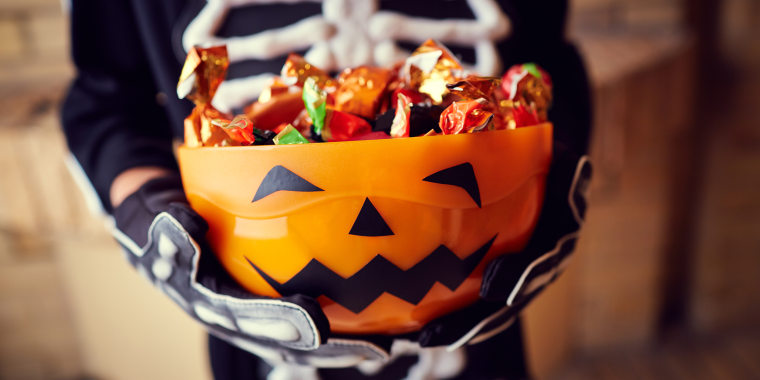Trick-or-treaters and Halloween partygoers consume a terrifying amount of sugar, so the hours afterwards can feel a little strange.
A typical child collects 3,500 to 7,000 calories in candy on the spooky holiday, one public health expert estimated. Adults help themselves, too, from their kids’ stash or at grown-up festivities.
In all, Americans planned to spend $3.1 billion on candy for Halloween in 2022, according to the National Retail Federation. Almost two-thirds — 60% — say chocolate is their favorite Halloween treat, the National Confectioners Association found.
All that sweet stuff can be frightening to doctors, with excess sugar linked to a host of health issues including obesity and heart disease. Sugar might also fuel the growth of cancer.
On a more immediate level, there’s the wild ride your body takes during a sugar binge.
“It’s definitely important that you don’t eat too much,” Dr. Jason Ng, an endocrinologist and clinical assistant professor at the University of Pittsburgh School of Medicine, told TODAY. “Your body essentially is on a roller coaster, and that roller coaster effect really takes a lot out of people.”
Still, it’s OK to treat yourself a bit. If you’re pretty healthy and only partake in a sugar binge once in a while, it’s not going to hurt you, Ng said. There are also ways to help your body recover.
Here's what you need to know:
1. Your body on sugar: A blow-by-blow account
A quick influx of sugar affects brain chemistry by boosting levels of dopamine, the “feel-good hormone,” and almost immediately providing a feeling of euphoria and excitement, Ng said. All that extra sugar also delivers extra energy, so you may become hyperactive.
At the same time, insulin levels rise to remove the sugar from the blood stream and convert it into stored energy. That's accompanied by a decrease in leptin, a hormone considered to be an appetite suppressant, so many people will crave even more candy, prolonging the high, he added.
Then comes the crash — anywhere from 20 minutes to a few hours after the sugar binge. Hormone levels quickly decrease as your body returns from the high back to normal.
“It’s almost the opposite of what you initially feel,” Ng said. “You have to go to the couch to lie down; you get the lethargy and the tiredness. You get a sudden overwhelming sense of fatigue.”
2. The type of candy you eat matters
To minimize the roller coaster effect, avoid treats that combine a ton of sugar — caramel, a cookie crunch, nougat, the works — into a little piece of candy, Ng said, naming Milky Way, Three Musketeers, and Snickers as some examples. They don’t have a lot of protein to help delay sugar absorption, he said.
Better options may include:
Dark chocolates: They have less sugar and contain antioxidants.
M&M’s with peanuts: the protein in the nuts delays the absorption of the chocolate part, Ng said.
Jolly Ranchers and similar candies: “They’re really small,” he noted. “You can’t just bite into it. You have to roll it around in your mouth, so that’s another good way of delaying the sugar rush… it’s a little more subtle.” (If you’re more concerned about tooth health, dentists have different advice.)
Lollipops: especially bigger ones you can’t just crunch into. There’s less risk of a sugar binge because you can’t eat other candy as fast, Ng noted. “It’s like a natural brake,” he said. It can also distract kids from reaching for other options.
3. How to recover from a sugar binge
To come back, you want to help your body get to equilibrium faster. Ng suggested these strategies:
Drink plenty of water: Keeping yourself well hydrated will help your body naturally flush some of the sugar out of the system.
Exercise: It doesn’t have to be hard core activity, Ng said. Just move around or take a walk to help you burn energy faster. It’ll get the blood pumping and everything going again.
Eat foods that are more stable forces of energy: Choose low-carb foods that contain fiber, protein and healthy fats. They’ll provide all-day energy, rather than quick bursts, to allow your body to adjust faster. Ng suggested snacks like peanut butter and apple slices, or hummus and veggie sticks. “Those kinds of foods that allow you to really even things out over hours are really good,” he said.
Happy, healthy Halloween!

